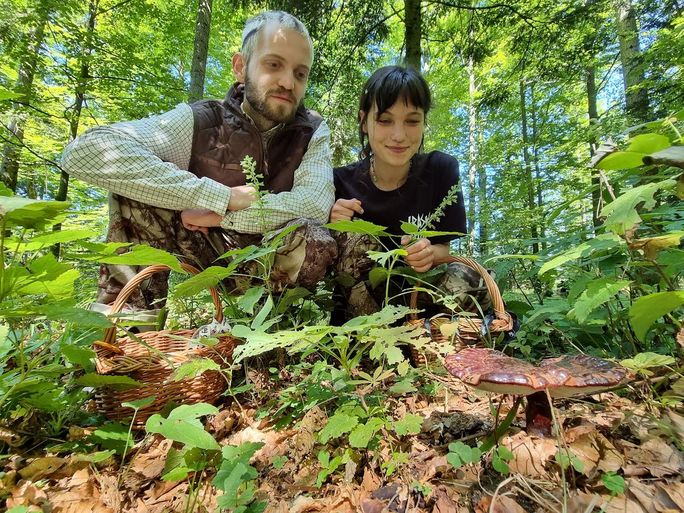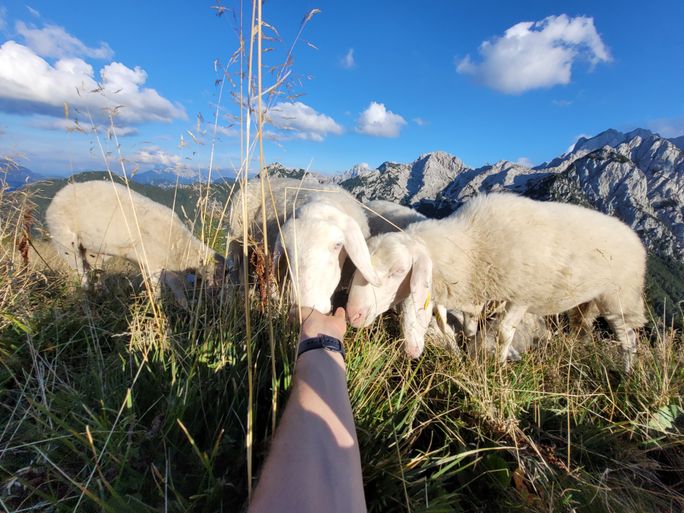
by Skye Mayring
Last updated: 9:00 AM ET, Sat December 14, 2024
Slovenia is one of Europe's most forested countries,
and it's no surprise that its outdoor activities are a major draw for travelers
who want to leave the hustle and bustle of their daily lives behind. From
foraging for fungi in Triglav National Park to sheep salting with shepherds in
Jezersko, there is no shortage of unique outdoor activities for first-timers
and repeat clients.
Truffle Hunting Demonstration In Istra
When there's a potential to uncover something in the
ground worth up to $4,000 per pound, you better believe there will be secrets.
Truffle hunters are notorious for their rivalries and clandestine hunts, often
occurring in the middle of the night (so as not to tip off the competition).
In the Istra region of Slovenia, however, some truffle
hunters are willing to reveal their secrets, at least to some degree. Zdenko Tartufi,
a family-owned tour operator and purveyor of truffle products, offers truffle
hunting demonstrations followed by a truffle-themed lunch—and the experience is
as deliciously good as it sounds.
Our tour originated in the Istrian village of Padna,
where I learned how truffles grow and where to find them from Samo, a
collaborator with Zdenko Tartufi, who has been truffle hunting for 30 years.
According to Samo, there is no hunt without his trusty Bruno, an adorable
Lagotto Romagnolo with curly fur and a playful demeanor.
Truffles grow underground in a symbiotic relationship
with the roots of certain trees like oak and hazelnut, and we kept an eye out
for a patch of bare ground around the trees that could signify truffles below.
While there are seven species that are fit for restaurant consumption,
Samo planted seasonal black autumn truffles for Bruno
to track down for us. While less of a surprise for everyone but Bruno, hiding
the truffles ahead of time ensures that guests have a successful hunt.
"With truffle hunting, there is never a guarantee
that we are going to find any truffles, this is why a demonstration is a better
fit. Plus, we don't want to disclose the locations where we've had success
since another hunter might see us," said Zdenko Tartufi co-owner Sara
Kocjancic Kaligaric. "Usually guests only see truffles on their plates in
restaurants and many haven't even seen a truffle in their lives. This is why
this tour is so special for them."
Truffles were plentiful on our plates at Gold Istra, a true highlight of my visit to
Slovenia. Lunch kicked off with a generous platter of truffle-infused cheese,
olive oil, honey and caviar—all covered in black truffle shavings. This was
followed by cream of cauliflower soup, and homemade Istrian pasta called fuže,
both covered with more truffle shavings than I've ever thought possible. Even
dessert, a truffle pana cotta was topped with, you guessed it, more truffles.
Zdenko Tartufi typically hosts lunch at Na Burji in the nearby village of Nova Vas
with a similar menu and wine pairing.
Cost: Demonstrations, inclusive of a coursed
meal and wine pairing, start at approximately $135 per person. Advisors can
also book demonstrations individually (starting at roughly $104 per person),
arrange a multi-course meal and wine paring at Gold Istra and add in their
desired commission.

Mushroom foraging is a popular activity for local Slovenians. (Photo Credit: Photo courtesy of Lifetime Experiences)
Mushroom Foraging in Triglav National Park
When a mycologist hands you a mug of steaming hot
mushroom tea, do you drink it? In this case, you most certainly do.
During a half-day tour in Triglav National Park with
tour operator Lifetime Experience, we sipped red-belted conk
tea to cleanse our systems and help us reconnect with nature before heading
into the forest to forage. Our guide—Katarina Grabnar Apostolides, a mushroom
determinator, who can identify about 1,500 species—explained how mushrooms live
and reproduce. Our goal: to find and classify mushrooms into edible, poisonous
and conditionally edible types (those that can be eaten if prepared correctly).
Equipped with wicker baskets that help spread mushroom spores and a small knife
to help carve out the mushrooms from the dirt, we began wandering the
wilderness.
Right off the bat, we discovered a funeral bell, an
extremely small but deadly wood-rotting fungus. Its familiar shape and light
brown color make it easy to confuse with other edible types. Our guide stressed
the importance of smelling the mushroom and collecting the entire stem, which
provides crucial identifying information. These were critical steps when we
came across another one of the deadliest mushrooms in Europe, the death cap.
"You can also tell that this is an amanita
phalloides, more commonly known as the death cap, by the ring around the
stem, its greenish-brown color and its eggshell-like bulb," said Grabnar
Apostolides. "If you ate it, you'd develop symptoms within two days. Feel
fine on the third day and possibly die on the seventh day. There is a 50%
chance of survival if treated early enough, but not without some chronic
consequences."
It wasn't all doom and gloom on the forest floor. I
also dug out edible saffron milk caps, porcini, white virgin wax caps and even
a few bright orange chanterelles. Porcini proved particularly hard to come by
since they are easily identifiable by amateur foragers and a favorite of humans
and deer alike.
"Mushrooming is like a treasure hunt," said
Lado Rot, the director of Lifetime Experience, also known as Dr. Fungi.
"Mushrooms can feed us, heal us or kill us. The key is knowledge, trust
and respect. And this is what I teach people. My mission is to reconnect people
with nature and themselves."
Tour locations and lengths vary, but all include a
local lunch. Packages that originate in and around Ljubljana are recommended
since Dr. Fungi has a partnership with a restaurant that can prepare the
foraged mushrooms. This was not the case for our tour, and understandably, I
couldn't find a restaurant on my own that was willing to take on the liability.
Therefore, if booking the tour outside of Ljubljana, ensure clients have full
kitchens in their accommodations so their forest floor treasures don't go to
waste.
Cost: Private tours for up to 12 guests cost
$1,160, while group tours start at $178 per person. Commission can be
negotiated with Dr. Fungi in advance.

Sheep salting. (Photo Credit: Photo courtesy of Drejc Karnicar)
Sheep Salting In the Alps
Two Jezersko-Solčavska sheep licked salt out of my hand
with fervent determination, their bright white wool shimmering in the sun.
Their rough tongues tickled my palm as salt and slobber dripped from their
chins, and I couldn't help but giggle.
Sheep salting is an age-old practice in Slovenia. To
this day, about once a week, farmers bond with their herd by offering them
handfuls of bread (it tastes like candy to the sheep) and salt (to provide
essential minerals). At Šenkova Domačija, a 500-year-old farmhouse in
Jezersko, clients can spend the better part of a day in the footsteps of
shepherds. Šenkova's sheep-salting hiking tour begins with a picturesque but
active morning hike through the valley of Ravenska Kočna and ends with a traditional
hot lunch at the historic Češka Koča mountain hut.
"Guests need to apply before we confirm because
the two-hour mountain hike can be difficult for some," said Polona
Karničar, whose family has lived at Šenkova and worked the homestead for at
least 14 generations. "We can also modify the experience by taking guests
directly to the mountain hut to look for the sheep there."
Clients are shepherded by first-class Alpine climber
and mountain rescuer Drejc Karničar who guides them through the pastures below
Grintovec—the highest mountain in the Kamnik–Savinja Alps. Along the way, Drejc
tells personal stories about Alpinism, the shepherding tradition and the many
benefits of sheep salting. As it turns out, letting his sheep roam free for a
few months a year creates happier animals with higher-quality wool and allows
the pastures back home to recover from the sheep's constant grazing.
As for lunch on the terrace of Češka Koča, expect a
hearty stew made with fresh veggies from Šenkova's garden and chicken or beef
from neighboring farms. In place of bread, dig into a side of Žganci, the
classic Slovenian meal of hardworking farmhands, made primarily from buckwheat
flour.
Cost: Tours run weekly in the summer and cost
approximately $69 per person, inclusive of lunch. Lodging is also available at
the homestead, and advisors should build in their own commissions as part of
the overall package.
For the latest travel news, updates and deals, subscribe to the daily TravelPulse newsletter.
Topics From This Article to Explore